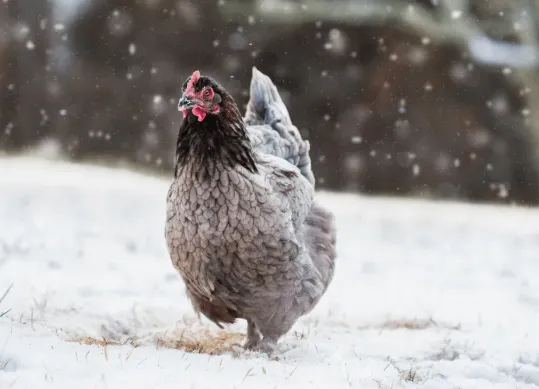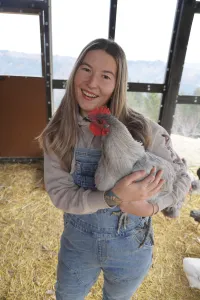


The Blog
Learn along side me as I share my Journey real time.

Your Guide to Keeping Chickens in the Winter
Your Guide to Keeping Chickens in the Winter
Winter brings new challenges for backyard chicken keepers and homesteaders alike. From freezing water to frostbite risks, the cold months require plenty of extra care to keep your flock happy and healthy. But don’t worry, it’s not that complicated!
Our winters are harsh on the mountain, but we’ve learned over the years how to support our flock in the cold months in the simplest and most sustainable ways possible. Living off-grid, we need to be mindful of our power usage, especially during the cold months when sun is minimal. This pushes us to really work with Mother Nature instead of relying on electric heat sources. Heated panels or heat lamps can sometimes be too large of a draw for our system, so we’ve implemented practical, low-energy solutions to keep our flock safe and comfortable.
If you’re wondering how to get your chickens through winter without stress (for you or them), this guide is for you.
How Cold Is Too Cold for Chickens?
Chickens are surprisingly hardy, but they still need protection from extreme cold. Cold-hardy breeds like Buff Orpingtons, Rhode Island Reds, and Australorps are naturally more tolerant of winter because they are heavier and have smaller combs, making them less prone to frostbite.
But what temperature is too cold?
✔️ Healthy, well-fed chickens with proper shelter can tolerate temperatures down to 0°F (-18°C).
✔️ Prolonged exposure to -20°F (-29°C) or lower can become dangerous, especially if they are wet, underweight, or don’t have proper wind protection.
What We Do:
Block Wind & Snow – We add panels to the chicken coop to keep out drafts and snowdrifts. All windows are kept shut. Fresh air is brought in through the vents and chicken coop door.
Deep Bedding Method – Extra hay or straw is a constant in our chicken coop. We refresh the coop with a new bale every 1–2 weeks to add insulation and warmth.
The Deep Litter Method, The Easiest Way to Keep Your Coop Warm
One of our favorite winter chicken-keeping tricks is the Deep Litter Method. Instead of frequently cleaning out bedding, we layer fresh straw, hay, or pine shavings every couple of weeks. Over time, the old bedding composts at the bottom, naturally generating heat to keep the coop warmer. You'll want to add litter when you notice a smell or moisture building up in the coop.
✔️ Less cleaning
✔️ Extra insulation
✔️ Helps chickens stay warm naturally
At the end of winter, you can remove the composted bedding and use it to enrich your garden soil—win-win!
Essential Winter Chicken Care Tips
✅ Keep the Coop Dry & Draft-Free – Moisture is the biggest threat, not the cold itself. Make sure there’s proper ventilation to prevent condensation, which can lead to frostbite. Avoid sealing up the coop too tightly!
✅ Prevent Frostbite – Apply Vaseline to combs and wattles, especially on roosters. Avoid heat lamps, which can increase humidity and pose a fire hazard.
✅ Keep Water from Freezing – Heated waterers help, but if you’re off-grid, here are some alternatives:
Use black rubber water bowls (they absorb heat from the sun).
Place water inside the coop (but not near bedding to prevent dampness).
Drop ping pong balls in the water to slow down freezing.
✅ Increase Protein in Feed – Chickens burn more calories in winter to stay warm. Adding mealworms, grubs, or cracked corn before bedtime helps raise their body temperature overnight.
✅ Let Them Outside (When Safe!) – Chickens can handle cold weather, but they hate walking on snow and ice. Spread straw, hay, or even wood chips outside their coop to encourage them to go out and get fresh air.
Winter Health Risks & Solutions
Frozen combs? – Apply petroleum jelly for protection. Make sure the coop is well-ventilated.
Egg production dropping? – Chickens need 14+ hours of light to lay consistently. Some people add a soft light in the morning, but we let our hens take a natural winter break.
Chickens refusing to go outside? – Snow can be intimidating. Spread straw or shavings to give them a dry, warm path.
Molting & missing feathers? – Chickens that molted late in the year may not have regrown their feathers before winter. Give them extra protein and shelter to help them stay warm.
Just Remember, Winter Chicken Keeping Doesn’t Have to Be Hard
Keeping chickens happy and healthy in winter doesn’t require electricity or expensive equipment—just some good planning, natural insulation, and working with nature instead of against it.
With the right cozy coop setup, high-quality feed, and smart winter strategies, your flock will thrive all season long.
Have any questions? Feel free to reach out! We'd love to help you trouble shoot your chicken coop.
Annie's Homestead is not affiliated by Facebook™ in any way. Facebook™ is a registered trademark of Facebook™ Inc
Branding and Website by RoyalT Studio

